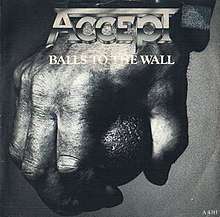Balls to the Wall (song)
"Balls to the Wall" is a song by German heavy metal band Accept. The song was released as the lead single from their 1983 fifth studio album of the same name. The anthemic title track is the album's best known song, and became Accept's signature song, for which a music video was shot that received American airplay on MTV.
| "Balls to the Wall" | ||||
|---|---|---|---|---|
 | ||||
| Single by Accept | ||||
| from the album Balls to the Wall | ||||
| B-side | "Losing More Than You've Ever Had" | |||
| Released | April 1984 | |||
| Recorded | 1983 | |||
| Genre | Heavy metal | |||
| Length | 5:44 (Album version) 4:28 (Video edit) | |||
| Label | ||||
| Songwriter(s) | ||||
| Producer(s) | Accept | |||
| Accept singles chronology | ||||
| ||||
Song meaning
Asked about the meaning of the song, guitarist Wolf Hoffmann replied:
- "We've always been interested in politics and in human rights and things like that, so a lot of the lyrics that we had in those days, and to the end actually, were dealing with human rights, for instance, and that's really what 'Balls To The Wall' is all about. 'One day the tortured will stand up and kick some ass!'"[1]
Music video
Filmed in January 1984 in London, the song's music video consists of clips of the band performing the song onstage intercut with scenes of a wrecking ball taking down a clock tower and scenes with fans of the band headbanging against the wall of the tower. Later during the buildup to the final chorus, the fans march through the rubble of the tower, and presumably head towards the stage where the band is performing. At the end of the video, singer Udo Dirkschneider rides the wrecking ball into the tower and takes out the front doors of the building it stands upon. When he discussed the scene with songfacts.com, Dirkschneider explained he was apprehensive about riding the ball because of the cold, wintry conditions on the day of the shoot, but decided to do it in the end. "It was very cold in London, near the airport", Dirkschneider said, "And especially when I had to step on this wrecking ball. I said, 'Please, no, I don't want to do this!' But in the end, I was young so I said, 'Okay, here we go.' But it was freezing like hell".[2] The song was also edited down for the video, with the guitar solo and Dirkschneider's spoken bridge being removed. The video edit of the song clocks in at four minutes and twenty eight seconds long, while the album version is five minutes and forty four seconds long.
Legacy
The video later appeared on Beavis and Butt-head in the 1993 episode "Tornado".
The song has also been featured on two VH1 countdown shows: as Number 38 on the 40 Greatest Metal Songs, and as Number 29 on the 40 Most Awesomely Bad Metal Songs Ever. It is also on the in-game radio for Grand Theft Auto: Vice City Stories on the "V-Rock" station, and appears as a playable track in the video game Guitar Hero Encore: Rocks the 80s, as a cover version. In this game, the word "ass" is censored, and replaced with "case" (and word "rape" was replaced with "fade").
The song was also covered by the following bands:
- Fozzy on their 2002 album Happenstance
- Altaria on their 2004 album Divinity
- Warrant only live, no studio versions.
- Benedictum on their 2008 album Seasons of Tragedy
- BulletBoys on their 2011 album, Rocked and Ripped
- Eyes of the Dead on their EP Let's Play Drink the Beer!!
- Amon Amarth on their 2011 album Surtur Rising (only limited edition)
- Chimaira on the 2001 compilation ECW Extreme Music Vol.2: Anarchy Rocks
- Puscifer on their 2013 EP Donkey Punch the Night
- Sinner
The song was featured in the 2008 movie The Wrestler.
Track listing
| No. | Title | Length |
|---|---|---|
| 1. | "Balls to the Wall" | 5:44 |
| 2. | "Losing More Than You've Ever Had" | 5:04 |
Personnel (Accept)
- Udo Dirkschneider – lead vocals
- Wolf Hoffmann – lead guitar
- Herman Frank – rhythm guitar
- Peter Baltes – bass guitar
- Stefan Kaufmann – drums
Personnel (U.D.O.)
Udo and Stefan's band U.D.O. also perform this song at the end of their shows. Since 2004, this line-up of U.D.O. has performed "Balls to the Wall" live:
- Udo Dirkschneider – lead vocals
- Stefan Kaufmann – lead guitar
- Igor Gianola – rhythm guitar
- Fitty Weinhold – bass guitar
- Francesco Jovino – drums
References
- Antunovich, Tony (November 27, 2005). "Interviews - Accept - Wolf Hoffman". Metal Eater. Archived from the original on April 21, 2013. Retrieved May 24, 2009.
- http://www.songfacts.com/detail.php?id=9304